They represented the most accomplished team of the Boston Bruins‘ most dominant period, posting the second-highest win total in team history and capturing the Stanley Cup for the second time in three years. Yet the 1971-72 Bruins didn’t just win; they provided a case study for why the Big Bad Bruins era resulted in two Stanley Cups and five appearances in the Cup Final over an 11-season span.
As such, an argument can be made that those Bruins were the best team in NHL history.
The 1971-72 outfit was underpinned by a powerful motivator: As the defending champion in 1970-71, Boston went 57-14-7 to post franchise records of 57 victories and 121 points which still stand today – yet the Bruins were stunned in the opening round in seven games by the archrival Montreal Canadiens, who finished 24 points behind Boston in the standings. Therefore, the mission in 1971-72 was to make up for that letdown and return to the top of the mountain – which the Tom Johnson-coached club did handily, losing only three playoff games en route to lifting the Cup for the fifth time in team history.
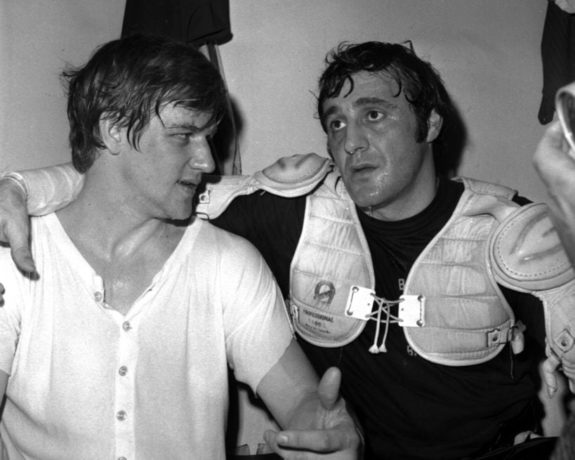
Whereas the 1969-70 champion Bruins were also overpowering, recording 99 points and losing just twice en route to a four-game sweep of the St. Louis Blues in the Cup Final, they simply weren’t as good their ’71-’72 counterparts, who with a mark of 54-13-11 notched the most victories and points by a champion in that glorious Bruins era.
That season’s club hadn’t made any significant personnel changes from the 1970-71 team – hardly surprising given their powerhouse roster and the fact that players couldn’t yet change teams easily through free agency. Hall of Famer Johnson, a six-time Stanley Cup winner as a player with Montreal, would add his name to the chalice for the eighth time and first as a coach after serving as Boston’s general manager during the 1969-70 season then taking over as coach the next season.
While the Bruins’ stars of ’71-’72 didn’t deliver the same level of performance as they did the previous season, when Boston boasted four 100-point scorers, those players still turned in stellar efforts.
Bruins of 1971-72 Were Powered by 4 Hall of Famers
In the midst of one of the most sublime stretches of offensive production in league history, Phil Esposito scored 66 goals with 67 assists for 133 points, topping the league for the second straight season. Espo’s 27 power-play goals that season were a record at the time, a mark he would match three seasons later, and he also tied his own NHL record with 16 game-winning goals – which still stands today.
Defenseman Bobby Orr, 23 years old and in the middle of arguably the most dominant period by any player in NHL history, tied his career-high with 37 goals and added 80 assists, leading the league in that category for the third straight season. He would also top the NHL in plus-minus for the third straight time at a staggering plus-83.
Orr would win his third Hart Trophy in a row as league MVP and took the Norris Trophy as the NHL’s best defenseman for the fifth consecutive season, going on to capture that honor for the next three seasons as well.
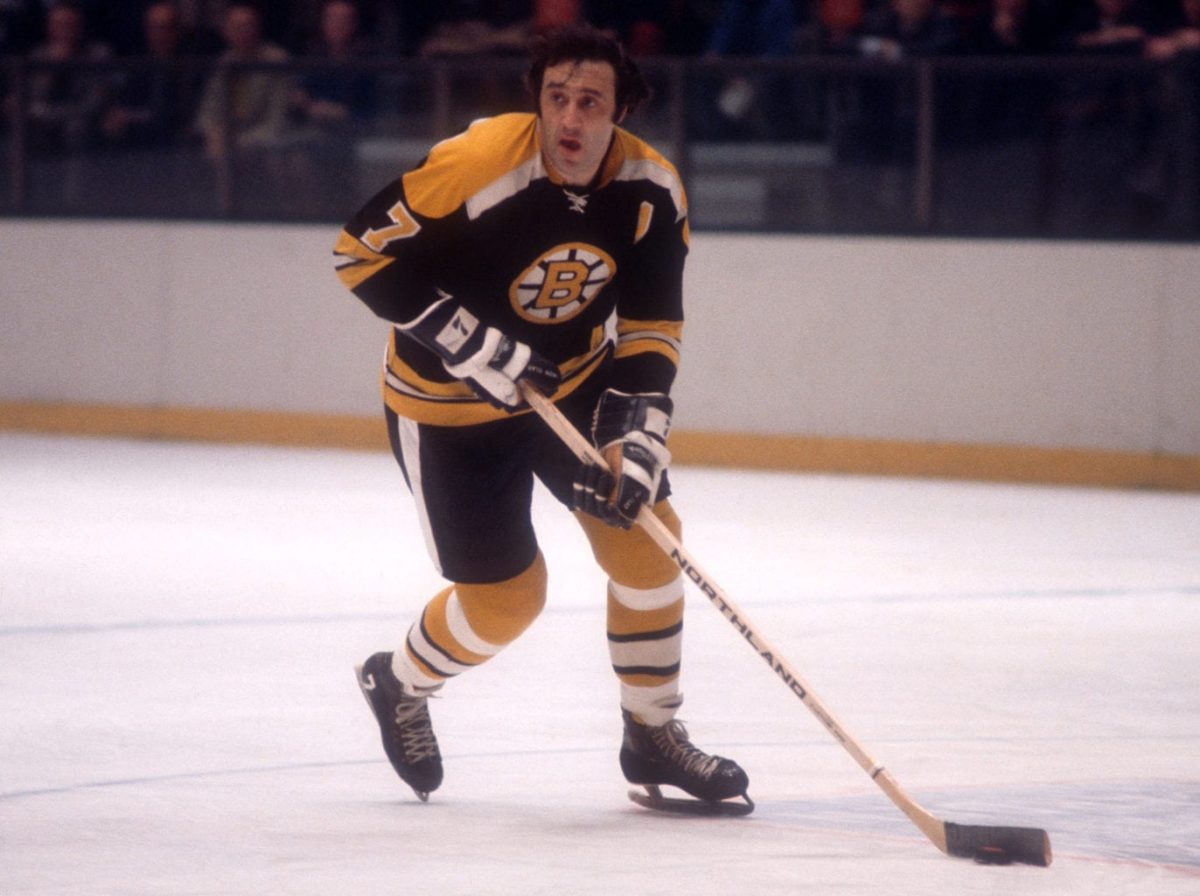
Esposito and Orr were hardly a two-man band. Forward John Bucyk, like Esposito and Orr, a future Hall of Famer, recorded 83 points while center Fred Stanfield had his best season with 79. Five other Bruins totaled at least 50 points as Boston topped the NHL in scoring for the fifth straight season.
Boston wasn’t bad at preventing opponents from scoring either, allowing the fourth-fewest goals in the 78-game season with 204. Spearheading that effort was goaltender Gerry Cheevers – rounding out those Bruins’ Hall of Fame foursome – who turned in a better performance than he did for the 1970-71 regular-season juggernaut, going 27-5-8 with a career-best 2.50 goals-against average in ’71-’72. He didn’t do it alone, as Boston again split the duties between Cheevers and 36-year-old Eddie Johnston, who went 27-8-3 with a 2.71 GAA.
The Bruins actually lost their season opener 4-1 to the New York Rangers – whom they would eventually face in the Stanley Cup Final – then went 5-0-1 over the next six. Boston fashioned win streaks of nine and seven games, a 13-game unbeaten streak and two 12-game unbeaten runs. They defeated the Los Angeles Kings 11-2, the Rangers 8-1, the Detroit Red Wings 9-2 and the Vancouver Canucks 9-1, and scored at least eight goals three other times.
1972 Playoff Dominance
Where the Bruins of 1970-71 left their magic in the regular season, the ’71-’72 group was all but unstoppable in the playoffs. Boston beat the Toronto Maple Leafs in five games in the first round, with Esposito and Orr pacing the team with nine points apiece, though three of the games were one-goal affairs.
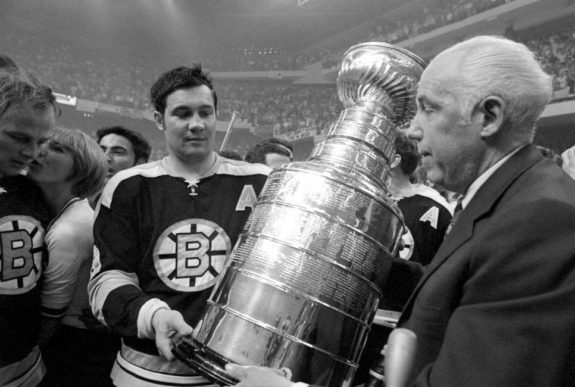
That wasn’t the case in the next round, as the Bruins hit their stride against the Blues, who again proved to be fodder for their overwhelming foes. Boston swept the series by a combined 28-8 score, and its depth was on display as Bucyk led the club with 12 points, while Stanfield and John McKenzie were next with nine apiece. Esposito and Orr each recorded seven points.
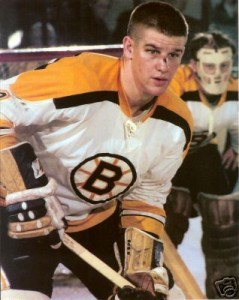
A much tougher challenge awaited the Bruins in the Final, as the Rangers had finished second in the NHL behind Boston with 109 points and possessed their own quartet of future Hall of Famers in Jean Ratelle, Rod Gilbert, Brad Park and Ed Giacomin, along with Vic Hadfield, who topped the club with 50 goals that season.
Yet the Bruins had easily handled the Rangers during the regular season, winning five of six meetings and outscoring the Blueshirts 24-4 in their victories, and the result was the same in the Cup Final. Those games proved much closer, with four of the first five contests decided by one goal – yet Boston came out on top in three of those. The Bruins closed out another championship by a 3-0 score in Game 6.
Ken Hodge paced the Bruins with five goals in the series, and he, Orr and Esposito tied for the team lead with eight points. In an interesting tidbit, Espo, who had scored 74 goals between the regular season and playoffs until that point, didn’t record one in the Final, doing all of his damage with assists.
Orr added to his award haul that season with his second Conn Smythe Trophy as playoff MVP, posting a postseason-best 24 points as well as a plus-20 rating in 15 games.
Best Version of Big Bad Bruins, One of the NHL’s Most Dominant Teams Was 1971-72 Squad
So why should this club be in the conversation for the best NHL team ever? First, the 1971-72 team was the best edition of the Bruins when they fashioned one of the most dominant stretches in league history. For 12 seasons from 1967-68 through 1979-80, Boston reached the 100-point mark 10 times, winning two championships and reaching the Stanley Cup Final three other times. The Bruins of that era have to be viewed as one of the NHL’s most accomplished teams, and the ’71-’72 club had the much better record of the two Stanley Cup winners during that time.
Second, the 1971-72 team was led by four Hall of Famers at the height of their powers, and two who likely rank among the very best ever. In the five seasons from ’70-’71 through ’74-’75, Esposito scored 326 goals. Only Wayne Gretzky and Brett Hull have scored more in a five-season span. The two-time MVP’s 717 career goals rank seventh all-time, and Esposito is 10th in points with 1,590.
Orr is among the most significant players of all-time for the way he revolutionized the role of defensemen, bringing the modern role of an offensive player who joins the rush from the backline and quarterbacks the power play into existence.
He did considerably more than change the game, though. A strong case can be made – and often is – that Orr’s six-season stretch from 1969-70 through 1974-75 was the greatest in NHL history. Orr was at least a plus-55 each of those seasons and plus-80 or better four times, highlighted by a league-record plus-124 in 1970-71 that still stands. He averaged better than 122 points per season in that span.
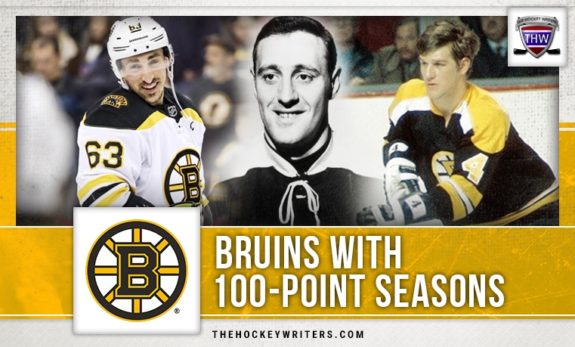
Finally, the Bruins’ opponent in the Stanley Cup Final was far from a pushover. Those Rangers represented the top team in an era of excellence for their franchise, one in which the Blueshirts topped the 100-point mark for three straight seasons and 90 for seven – even though they never won a Cup. Like Boston, New York boasted a loaded roster led by the aforementioned four future Hall of Famers.
Yet the Bruins followed the one-sided season series against the Rangers by handling them again in the Final, giving Boston nine victories in 12 matchups with a powerhouse 109-point squad. The playoffs represent the ultimate barometer for teams that dominate in the regular season, and those Bruins passed with flying colors, one season after being shocked in the first round.
The 1971-72 Bruins were the best team in one of the NHL’s most outstanding eras by a franchise, led by some of the league’s greatest stars and outclassing a powerful opponent to win a championship. Those factors should put this club into the conversation as the best of all time.